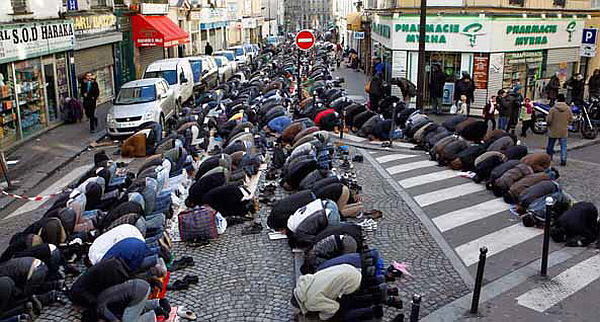Religious practices are a fundamental right in any democratic society. However, when such practices spill over into public spaces, particularly roads, they raise serious concerns about public inconvenience, law enforcement, and social harmony. The decision by the governments of Uttar Pradesh and Maharashtra to prohibit prayers on main roads, especially during Ramadan, is a step in the right direction. This move addresses a growing challenge not only in India but also globally, where religious gatherings in public spaces have led to disruptions and tensions.
The practice of offering namaz (Islamic prayers) on public roads has been observed in many parts of India, particularly during Ramadan and other significant religious occasions. This phenomenon is not exclusive to India. Several European countries, including France, have faced similar issues, leading to governmental crackdowns. In France, for instance, the government had to intervene strictly to prevent such gatherings after reports of road blockages and communal tensions.
What makes this situation more perplexing is that many Islamic countries, including the United Arab Emirates (UAE), have clear regulations against public prayers blocking roads. If such practices are disallowed in Muslim-majority nations, why should they be justified in countries where Muslims are a minority? This raises questions about whether these actions are expressions of faith or deliberate provocations testing the limits of secular societies.
Blocking public roads for religious prayers, irrespective of the faith involved, violates existing laws and inconveniences the general public. The right to religious freedom, as enshrined in the Indian Constitution, does not override the right of free movement for others. The Supreme Court of India has time and again reinforced that religious expressions should not infringe upon public order and civic amenities.
Beyond legality, such road occupations also create unnecessary flashpoints for communal discord. They provide opportunities for political exploitation, with parties often choosing to appease certain groups to secure vote banks rather than enforcing the rule of law. This appeasement has emboldened some communities to extend such practices even to railway tracks and moving trains—a blatant disregard for public safety and national interests.

Several non-Islamic nations have faced similar challenges and responded with strict regulations. In the UK and France, instances of Muslims offering prayers on roads led to a backlash, resulting in restrictions and legal actions. The French government, known for its staunch secularism, implemented a complete ban on road prayers, citing disruptions and security risks.
The contrast with Islamic nations is striking. Countries like Saudi Arabia, the UAE, and Egypt have clear rules mandating prayers be conducted within mosques or designated prayer spaces. These nations prioritize public order over religious demonstrations in public spaces, setting an example that secular democracies should consider.
The decision by the Uttar Pradesh and Maharashtra governments should be seen as a precedent for other states. However, enforcement must be even-handed, ensuring that no religious group—Hindu, Muslim, or any other—is allowed to block public spaces for worship. Some key steps to address this issue include:
- Designated Prayer Spaces: Governments should work with local religious authorities to ensure that adequate spaces, such as community halls or designated open areas, are available for large gatherings during festivals.
- Strict Law Enforcement: The police and local administration must be empowered to prevent unauthorized public prayers that obstruct roads or other essential public infrastructure.
- Public Awareness: Religious leaders and communities should be educated about the importance of maintaining public order and respecting civic responsibilities alongside religious obligations.
- Non-Discriminatory Policies: The enforcement of public space regulations should apply equally to all religions. Whether it is namaz, Hindu processions, or other religious gatherings, no group should have special privileges to occupy roads at the expense of public convenience.
Religious freedom must be balanced with civic duty. No faith should have the right to block public roads, cause inconvenience to others, or disrupt the daily lives of citizens. India, being a secular democracy, must ensure that the rule of law prevails over political appeasement and communal sensitivities. The bans imposed by Uttar Pradesh and Maharashtra set a necessary precedent, one that should be adopted nationally and globally to prevent unnecessary disruptions and maintain social harmony.






